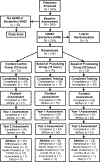A 2-year longitudinal randomized controlled trial examining the transfer of speed of processing training to secondary cognitive domains in middle-aged and older adults with HIV-associated neurocognitive disorder: Results of the think fast study
- PMID: 37191339
- PMCID: PMC10651797
- DOI: 10.1080/13854046.2023.2212867
A 2-year longitudinal randomized controlled trial examining the transfer of speed of processing training to secondary cognitive domains in middle-aged and older adults with HIV-associated neurocognitive disorder: Results of the think fast study
Abstract
Objective: As people with HIV (PWH) age, they are at-risk of developing cognitive impairments compared to their seronegative counterparts. Although speed of processing (SOP) training may help improve this cognitive ability, less work has examined transfer to other cognitive domains. This study examined the effect of SOP training has on secondary cognitive domains in PWH aged 40+ years.
Method: In this 3-group 2-year longitudinal study, 216 PWH with HIV-associated neurocognitive disorder (HAND) or borderline HAND were randomized to either: (1) 10 h of SOP training (n = 70); (2) 20 h of SOP training (n = 73); or (3) 10 h of an active control training (n = 73). Participants completed a comprehensive cognitive battery at baseline, immediately after training, and at 1 and 2 years. This battery yielded global and domain specific T-scores as well as a cognitive impairment variable. Generalized linear mixed-effect models were fitted to estimate between-group mean differences at the follow-up time-points adjusted for baseline.
Results: No clinically or statistically significant improvements in any of the cognitive outcomes were observed. A sensitivity analysis was conducted; conclusions replicated those of the main analysis, with two exceptions: Global Function T and Psychomotor Speed T showed relevant training improvements among the intervention groups over the control group at the immediate post time point.
Conclusions: Although SOP training has been shown to improve cognitive abilities that correspond to driving and mobility, such training has limited therapeutic utility in improving cognition in other domains in PWH with HAND.
Trial registration: ClinicalTrials.gov NCT02758093.
Keywords: Brain fitness; HIV-Associated neurocognitive disorder; cognitive reserve; cognitive training; neuroplasticity; speed of processing.
Conflict of interest statement
Conflicts of Interest/Competing Interests
Figures
References
-
- Cody SL and Vance DE, The neurobiology of HIV and its impact on cognitive reserve: A review of cognitive interventions for an aging population. Neurobiol Dis, 2016. 92(Pt B): p. 144–56. - PubMed
Publication types
MeSH terms
Associated data
Grants and funding
LinkOut - more resources
Full Text Sources
Other Literature Sources
Medical
Research Materials

